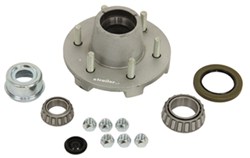
How to Determine Trailer Axle Rating from Axle Diameter and Bearings Used in Hubs
Question:
Hello, with the pictures I have sent you can you please tell me what the axle carry weight is. The hub is stamped AL-KO 7200 along with the stamp Dia. 12.090. The tongue picture is the only capacities I can find on the trailer. The tubes are at least 3 inches and hub has 6 studs. The leaf springs have four leafs. As you can see it is a double axle trailer and I am in the middle of restoration . Can you also tell me what the gross carry weight is depending on what you come up with from pictures?
asked by: Tony H
Expert Reply:
Often an axle's weight rating will appear on a sticker or plate on the axle beam itself, or sometimes the trailer's main identification sticker will include axle ratings. This is helpful unless of course the axles have been replaced during the trailer's lifetime.
Axle diameter can get us at least in the right weight capacity neighborhood. An axle with 3-inch diameter typically has a 6K or 7K weight rating. One that is 3-1/2-inches in diameter is usually rated for 8K. In rare instances an axle of 3-1/2-inches diameter could be rated as low as 3500-lbs.
Hubs with 6-wheel studs could be rated for axles from 3500-lbs up to 6000-lbs. If you pull one of the hubs and remove its bearings, those bearing part numbers can also help you determine capacity. For instance, hubs for a 3500-lb axle often use bearings L68149/L44649; hubs for a 5K or 6K axle often use bearings 25580/LM67048. You can refer to the linked article for more on axle ratings.
As far as the overall trailer's weight capacity, that is harder to estimate. Trailer builders do not always use the same amount of safety margin in deciding on what rating to give their trailers. The trailer's frame COULD be built to be far stronger than the combined axle rating. Or it could be built to be just strong enough to match that rating.

Product Page this Question was Asked From
Dexter Trailer Idler Hub Assembly for 6,000-lb E-Z Lube Axles - 6 on 5-1/2 - Galvanized
- Trailer Hubs and Drums
- Hub
- EZ Lube
- 25580
- 15123
- For 6000 lbs Axles
- 1/2 Inch Stud
- 6 on 5-1/2 Inch
- 14-1/2 Inch Wheel
- 15 Inch Wheel
- 16 Inch Wheel
- 16-1/2 Inch Wheel
- Dexter
more information >
Featured Help Information
Miscellaneous Media

Continue Researching
- Video: Timbren Axle-Less Trailer Suspension System Installation
- Search Results: timbren 2000
- Search Results: lock n roll
- Search Results: lock n roll hitch
- Video: Lock N Roll Adjustable Trailer Coupler - Off Road Coupler - 336TS502 Review
- Video: Lock N Roll 3-Position Channel Articulating Hitch Review
- Shop: Trailer Hitch
- Shop: Timbren Axle-Less Trailer Suspension - Heavy Duty - Long Spindle w/ 4" Lift - 4 Bolt - 2K
- Shop: Timbren Axle-Less Trailer Suspension - Heavy Duty - 4" Drop - 4 Bolt Flange - 2,000 lbs
- Shop: Lock N Roll Articulating Coupler - A-Frame - Trailer Side - 11K
- Shop: Lock N Roll Articulating Trailer Hitch for 2" Receivers - Vehicle Side - 11,000 lbs
- Shop: Lock N Roll Articulating Trailer Coupler for 2" Receivers - Trailer Side - 11,000 lbs
- Shop: Lock N Roll Articulating Hitch - Adjustable Channel Mount - Vehicle Side - 11,000 lbs
- Shop: Lock N Roll Articulating Coupler - Adjustable Channel Mount - Trailer Side - 11K
- Q&A: Wiring for Dexter Electric Over Hydraulic Brake Actuator # K71-651
- Q&A: Difference Between 3-Leaf and 4-Leaf Leaf Springs
- Article: Where to Position the Trailer Axle?
- Video: Review of Lippert RV Ladders - On-The-Go Angled Telescopic Ladder - LC64HD
- Article: How to Tell the Weight Rating of a Trailer Axle
- Search Results: spring seats
- Q&A: How to Protect Replacement Trailer Bearings for Long-Term Storage
- Search Results: axle parts
- Search Results: hub
- Search Results: weld on spindle
- Shop: Fifth Wheel Hitch
- Q&A: How to Determine Weight Capacity of Trailer Axle
- Q&A: Tips for Determining Square Trailer Axle Capacity
- Q&A: How To Determine the Weight Capacity For a Trailer Axle
- Q&A: 16 inch Trailer Wheel with 6 Lug Bolt Pattern that Can Handle 110 PSI
- Shop: RV Camera






